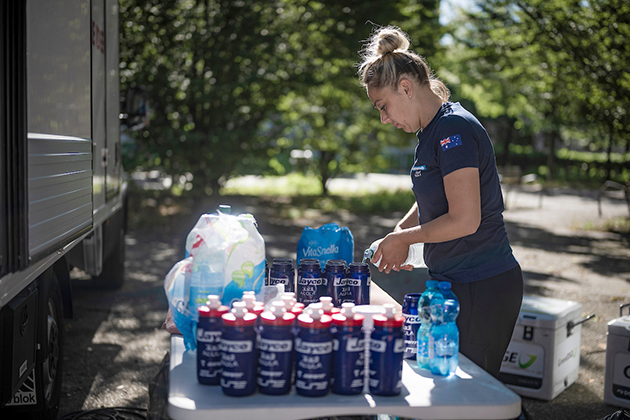

Bicycle Racing News and Opinion,
Tuesday, November 19, 2024
Back to news and opinion index page for links to archived stories | Commentary | Our YouTube page
2024 Tour de France | 2024 Giro d'Italia
One can never know for sure what a deserted area looks like. - George Carlin

Les Woodland's book Dirty Feet: How the Great Unwashed Created the Tour de France is available in print, Kindle eBook & audiobook versions. To get your copy, just click on the Amazon link on the right.
Upcoming racing:
- December 15: Namur Cyclocroos-Citadelcross
Latest completed racing:
- November 17: Flandriencross
- November 3: European Cyclocross Championships
- November 1: X20 Trofee Oudenaarde-Koppenbergcross
- October 27: Superprestige Overijse-Vlaamse Druivencross
- October 15 - 20: Tour of Guangxi
- October 20: Japan Cup Road Race
- October 20: Veneto Classic
- October 16: Giro del Veneto
- October 13: Chrono des Nations
Here’s the team’s post:
Soigneurs are the engine room of any professional cycling team. From massaging the riders to keeping staff fed and watered on a busy race day, and much more beyond that, they keep the whole squad going.
It’s a job that can be hard to define and it takes a special person to take on the role. Nadia Zuccherelli has been with the team for almost a decade and is one of the team’s longest-serving staff members.
She started with the women’s squad before moving over to the men’s roster more recently. “GreenEDGE is a second family to me, absolutely,” she says of life on the road with the Aussie team.

Nadia Zuccherelli getting things ready for the day's racing.
“I like the competition, and the adrenaline. I also like the sport in general and when a person tries to get the best possible out of their body. When you work with a group of staff and we get a good result with the riders, this gives you a lot of emotion and a lot of passion for the job.”
Zuccherelli grew up not far from Bologna, Italy, with her parents, two brothers, and sister. She was a ‘full gas” child that struggled to sit still for long and loved getting involved in sports, including cycling.
Before her career as a soigneur, Zuccherelli was in the mix of the peloton as a rider. She spent several seasons racing with Italian teams and competed at the Giro d’Italia Women (formerly known as the Giro Rosa) twice before deciding to retire at 23.
After a few years out of cycling’s hustle and bustle, a chance to return landed at her door in 2009 and she grabbed it. Since then, she has never looked back.
“I was a rider, but I was not so strong, so I decided to stop. But after a few years a director called me because he needed a soigneur for the Giro Rosa. He asked me ‘Nadia, do you want to try it’ and I said ‘yes, I can try.’ I started with the Giro Rosa, and we won, and then ‘ciao’,” she laughs; Zuccherelli was hooked.
“It was my first experience as a soigneur, and it was amazing. In that moment, I thought, maybe this job can give me a lot of options and maybe I can continue with it.”
In the family
Since that first taste with the Cervélo Test Team, Zuccherelli has worked with several teams, including the USA and Australian national squads, before joining GreenEDGE Cycling.
It wasn’t a total coincidence that the Italian became a soigneur as it was already in the family. Though they never did it professionally, both her parents had small stints as soigneurs for Italian teams, and as soon as she quit racing, Zuccherelli started studying for a qualification in massage – a key part of the job.
“I started school immediately. When I was young, my father and mother were soigneurs also, just as a hobby,” she says. “In my mind, I thought when I was older, I wanted to do that. So, when I stopped with cycling, immediately after one week I was in school, and I studied for three years.
“My parents did it just for the passion. My father was a very busy man, and he liked to have a lot of different hobbies and being a masseur was one of them.”
Working in a cycling team is a huge collective effort, not just inside the peloton. There’s over 150 people that work at GreenEDGE Cycling but races usually see a smaller group travelling together.
The Tour de France requires the most resources with about 25 staff members doing the whole three weeks alongside the eight riders. The staff spend many hours a day together on the road and at the dinner table, and that is something Zuccherelli loves about the job.
“I like to be part of a group and try to make everything good for the group. I am not an individualistic person,” Zuccherelli says. “Sometimes, I can be a solitary woman. I like to go to the room and listen to some music alone, but in the end, I love to be together. I think it’s good to have a nice balance, not all one or the other. A good balance is important when you are together on a long race and in this team we have this.”
Home comforts
Zuccherelli is proud of the career that she has built in cycling and the experiences the sport has given her. She loves to share that passion and pride with her family when she does have time at home, particularly with her two young nieces.
“I love my family. It’s one of the most important parts of my life and they support me. Sometimes, my mother tells me ‘Nadia, you need to stay at home more because you are away so often’,” she laughs. “Normally, after the races, I go straight to see my nieces. My sister has three children now. I love it and when I’m at home I spend a lot of time with them and, of course, my parents too. They give me a lot of energy.
“Maybe we go out for ice cream, and they ask me about where I was. I like to show them my passion, not for the cycling but for travel, knowing different people, and opening the mind. I think that it’s very important. You only get one life, and I think it’s good to experience different atmospheres, and different mentalities.”
When Zuccherelli is at home in Italy, it’s not all downtime with the family, though. Alongside her role with the team, she runs her own massage clinic. She has built the clinic up from scratch over the course of seven years, something that she’s extremely proud of.
Though it is a lot of work to run her own business as well as spending a lot of time on the road as a soigneur, she has boundless energy for both and wants to keep doing both together as long as she can. It helps that she has a support network of staff at her clinic, as well as colleagues at the team.
“I started the clinic seven years ago and I love it there. I put a lot of energy into it, I cried a lot inside at the beginning,” she says. “When Covid arrived, I had to close for three or four months, and it was a very emotional and difficult. In that moment, I had three girls that worked for me, and it was so hard to tell them that they had to stay at home so I could close. This was one of the most difficult periods of my life.
“Now I have seven girls that work for me and I think I’ve done something good. It’s not easy but I think I have a good job. Some people say to me that I have to make a decision, either stay with the team or the clinic, but I don’t like when people tell me that I have to do something. I can’t decide between cycling or my clinic.”
Back to news and opinion index page for links to archived stories | Commentary







